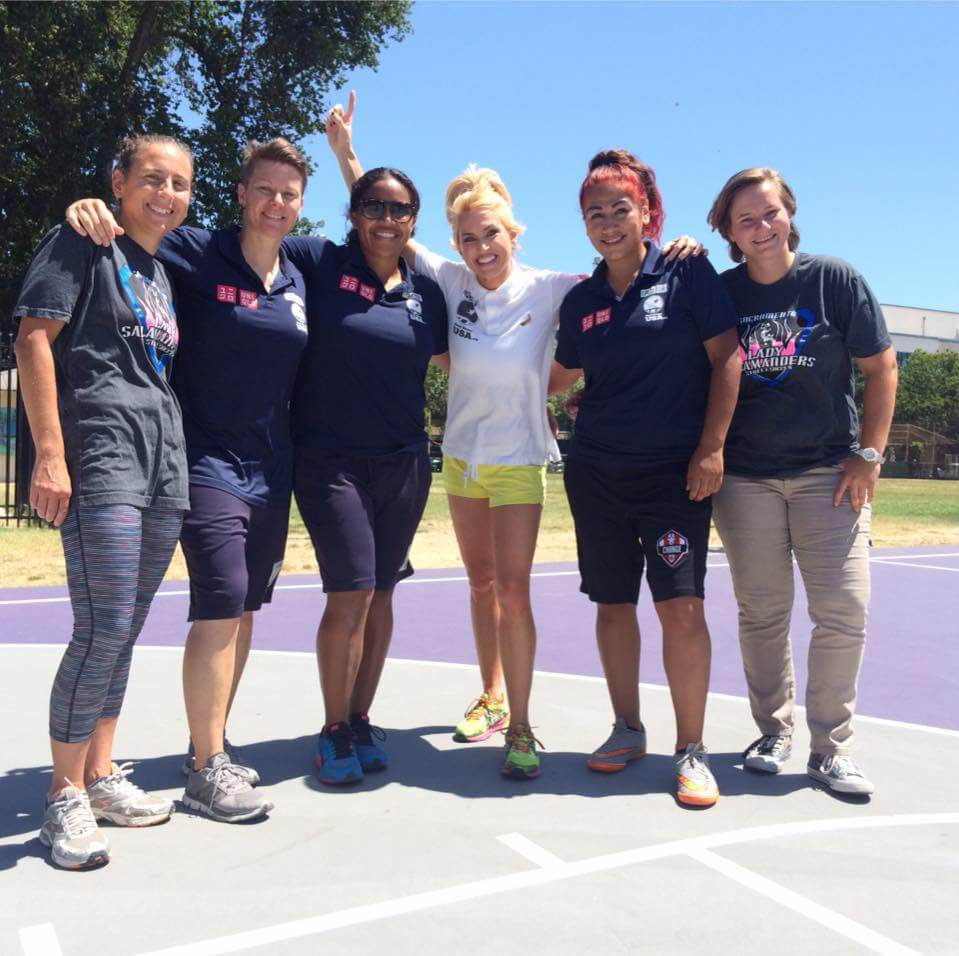From an Adult Participant to SSUSA Volunteer to a SSUSA Coach, Jen Schpira finds her Family with Street Soccer USA
“As the first female SSUSA player from Sacramento, I felt like I had a very unique perspective as to how the SSUSA experience could positively affect other women and to the challenges that women faced in trying to rebuild their lives from abuse, addiction and homelessness. I remember when I came back from playing in the Homeless World Cup with SSUSA’s FIRST ALL women’s team, I was filled with so much purpose and motivation to make this available to other women”, states Lisa Wrightsman. In 2016, Lisa and fellow colleagues in Sacramento launched the SSUSA youth initiative to see if we could successful reach and provide soccer to youth who could not afford the “pay to play” model of soccer and had no access to the game. We were very successful with our youth initiative and had over 2500 attendances in a 12 month period. A lot of success goes to one of Lady Salamanders, Jen Schapira, who decided to help volunteer coach and who is now one of Sacramento’s paid coaches.
Jen found out about the SSUSA Sacramento Lady Salamanders Program in 2014 through a Women’s Empowerment Organization which works with women who are experiencing homelessness. She rode her bike 15 miles to get to her first practice. That was the first of many 15 mile bike rides to and from practice. She was determined to be a part of this new amazing family. Fast forward a few months, and Jen found herself boarding the plane to the SSUSA National Tournament in Philadelphia and became a part of Sacramento’s first championship team. But it didnt stop there. During the National Tournament, Jen was selected to represent the SSUSA Women’s Team at the Homeless World Cup (HWC) in Glasgow, Scotland. After returning from these amazing opportunities Jen truly felt a sense of family with SSUSA. She volunteered over 150 hours of coaching for Sacramento’s youth initiatives and is now a proud paid coach. Her story and passion for SSUSA shines through her coaching and it is her turn to bring out positive life changes in those she meets through the sport of soccer.
Sacramento’s Program Director, Lisa Wrightsman sits down with Jen to gain a bit more insight into her journey with SSUSA.
LW: When you first joined the Lady Salamanders soccer team, how did that impact your current circumstance?
JS: It really expanded my life on multiple levels. I hadn’t played soccer in 19 years and I still missed it deeply. When I heard about SSUSA Lady Salamanders I was intrigued and excited. Everyone was very positive and friendly, it had been a long time since I’d been on a team that was so supportive, encouraging and fun. Being a part of the Lady Salamander team really worked for me when everyday was a fight battling mental illnesses and cross addictions. It game me another support network and added that pure love of a game that became fun again. No more pressure to be perfect.
LW: How did the physical exercise help you?
JS: I always stayed active, but like my addictions I did the majority of sports or working out alone and was missing the social element. Being able to join the SSUSA Lady Salamanders was such a gift. After being alone or with an abusive partner for the last 17 years of addiction I truly didn’t know how to socialize or communicate and this was a safe space to start practicing. It also filled a sort of high intensity and awareness to my physical health.
LW: What was it like to be a part of the team? Travel with the team?
JS: Being a part of the Lady Salamanders was the start of being part of a healthy community outside of a 12 step program. By playing soccer with the ladies and truly getting to know many of them from traveling to SSUSA National Soccer Tournaments was the end of isolation for me. Also the trips [Philadelphia, Scotland] have been amazing and I am especially gracious after having lost everything, and the threat of being on the streets again were very real.
LW: What are some things you have noticed about yourself as a coach?
JS: Coaching brought out a passion and talent I never knew I had- working with kids. After college I got locked into that particular profession that I thought I had to keep pursuing because of the comfortable salary. I sold out and closed myself off from growing and I was operating off of fear and irrationality. The best thing about my addictive actions stripping me of everything is now I am open to trying new things and changing for the better. It feels really natural to me to coach. I gave this coaching thing a try and it just worked out for me. I got to be that free spirit I once was, running around and giving encouragement in the form of high fives.
LW: What are the differences you have noticed from being a player and being a coach?
JS: When I was a player I was coming from a place of feeling broken and without any self esteem. What I needed was support and encouragement. I needed to know someone cared, and that I mattered. As a coach I can give that back to some of the kids we work with in a community that I can call home now. I started out as a volunteer and it gave me the chance to give back.
LW: How has coaching impacted your life?
JS: Working with others as a coach has become a very positive way to give back and to engage in healthy relationships with healthy boundaries, and with something that is so meaningful to me. I have struggled with co-dependency and depression all my life and giving too much attention to the wrong people, but as a coach it always me to give attention to kids who need it the most and in a very selfless way and make soccer as positive experience as it was for me.
The non- profit world is where I belong. Today I have a sense of purpose that’s emerged by being a SSUSA coach and I am open to doing the footwork to get to whatever next level God has in mind for me.




